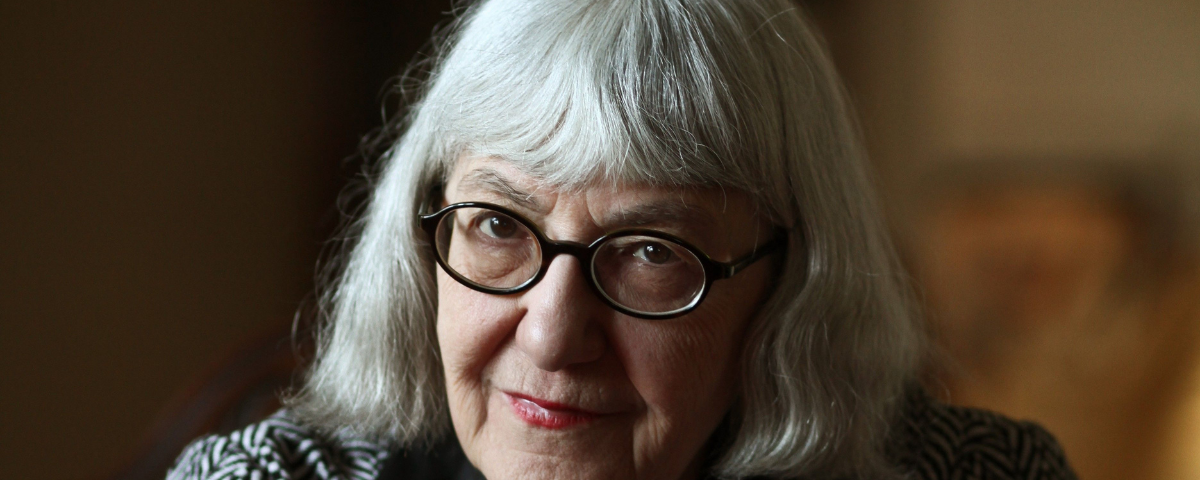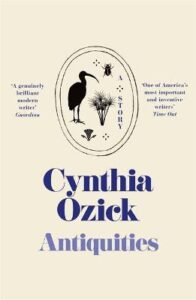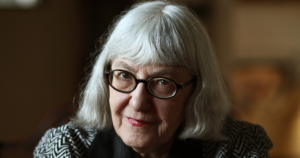Living Antiquities: Ozick, Great Books & Judaism

Sarah Rindner Blum joins TRADITION’s ongoing conversation about the state and fate of the Great Books
In a recent New Yorker review, Louis Menand makes an excellent point about the limits of university Great Books curriculums. These programs seek to introduce all university students to a selection of classic literary works – from Plato to Shakespeare to Toni Morrison. Menand, responding to a new pair of books which defend such curricula against postmodern assaults, observes that there has always been discontent and anxiety surrounding the place of the humanities in the modern university, and this stems from a deeper confusion about what the purpose of university education is more broadly. There was once a clear sense of what should comprise the literary canon, which by its nature is meant to serve as a font of general wisdom rather than a curriculum for a specific course of study. The modern university system, however, privileges specialization over general education, and is simply not structured in a way that makes Great Books courses crucial. Moreover, it’s not clear to Menand that this is a problem: “The humanities do not have a monopoly on moral insight. Reading Weinstein and Montás [authors who advocate for Great Books curriculums] you might conclude that English professors, having spent their entire lives reading and discussing works of literature, must be the wisest and most humane people on earth. Take my word for it, we are not. We are not better or worse than anyone else.”
There are many wonderful cases to be made for the contributions of great books to our culture, our civilization, and to ourselves. But on a common-sense level, Menand is right. While people who love literature (myself included) can make a compelling case for why these texts enrich our lives, we cannot generalize that those who read great literature are on the whole better people than those who are interested in other matters. Countless well-known authors and literature scholars have been involved in every kind of sordid affair imaginable. Indeed, whenever a new anti-Semitic tinged crusade against the Jewish State pops up, literature departments are inevitably leading the charge. Menand writes that “knowledge is a tool, not a state of being.” To me there is no doubt that the experience of reading Cervantes or Jane Austen can generate profound insights into the complexity of human experience, and morally sensitive writers like George Eliot or Leo Tolstoy create a powerful case for virtue. Yet clearly something else is necessary in order to lay the foundations of a moral life in practice.
Menand, for all of his insights, doesn’t tell us, or perhaps doesn’t actually know, what sort of tools can improve one’s moral life. His alternative is presented mostly as an aside: “a class in social psychology can be as revelatory and inspiring as a class on the novel.” He doesn’t quite get to the heart of the matter. Yet a clue may be found earlier on in the essay, when he describes the development of the modern university and its departure from its medieval moorings: “In the creation of the modern university, science was the big winner. The big loser was not literature. It was religion.” Perhaps unwittingly, Menand hints that the entire structure of contemporary universities, Great Books courses notwithstanding, is missing crucial ingredients necessary for students to build character on top of padding their resumes or building an impressive specialty.
In her wonderful recent novel Antiquities, the noted American Jewish author Cynthia Ozick addresses a similar question. The novel explores the unlikely friendship of two boys, one a privileged though emotionally handicapped WASP, the second a brilliant Jew with a mysterious past. As a writer, Ozick lives and breathes Western literature, the stuff of Great Books curricula and beyond. She has a lifelong preoccupation specifically with the author Henry James, of whom her “obsessive” readings have inspired the novels Trust and Foreign Bodies, the latter being a direct homage to James. Ozick is also a Jew with a distinctly traditional bent, and like Menand she refuses to fetishize the very material that animates her life work, though perhaps for different reasons.
Antiquities is narrated by Lloyd Wilkinson Petrie, an aging trustee of “Temple Academy,” a defunct elite boarding school. Ozick has Petrie speak in 1949 about events that took place in the academy about half a century earlier. Petrie is proud of the aura of culture and humanism that pervades a place like Temple Academy. In a kind of inside joke on Ozick’s part, he dwells on the fact that the founding members of the Temple family are cousins to Henry James, whose portrait hangs in the chapel. Petrie speaks with pride about the school’s Latin and French studies. He also describes, with nonchalance, the social ostracization of the handful of Jewish peers who were allowed entrance into the school: “to speak to a Jew would be to lose one’s place in our boyish hierarchy.” He is especially upset by how Temple Academy itself is occasionally the target of anti-Semitic vandalism, “Most unfortunate was the too common suspicion that ‘Temple’ signified something unpleasantly synagogical, so that on many a Sunday morning the chapel’s windows (those precious panels of stained glass depicting the Jerusalem of Jesus’s time) were discovered to have been smashed overnight.” Petrie decries this brutality not as inherently wrong but as unseemly as a case of mistaken identity, “How ironic were these ugly events, given that the Academy’s spirit was premised on English religious and scholarly principles.”
For Ozick, of course, the juxtaposition of such “religious and scholarly principles” with Jew-hatred, however genteel, is not a coincidence. Yet her point is not just to point out hypocrisy – how horrified Petrie is to consider that beautiful stained glass windows of Jesus’s Jerusalem might be confused for something Jewish. Or how dismissive Petrie is of Jewish people given how indebted his own idealized culture is to the Bible and to Jewish contributions to Western Civilization. Ozick suggests, albeit indirectly, that the best stewards of Petrie’s idealized Western culture are actually the very people whose participation in that culture is so suspect.
 There are a few Jewish characters in the book who embody this dynamic but none more than Ben-Zion Elefantin, a Jewish boy with flaming red hair and sidelocks who has somehow ended up at this patrician academy. Elefantin becomes a great source of fascination and confusion for Petrie. Petrie regales him stories with stories about Henry James Senior, the novelist’s father, and the great transcendental philosopher Ralph Waldo Emerson – yet Elefantin could not care less. Nevertheless, despite his indifference to the elite atmosphere of the academy, and the fact that English is not his first language, Elefantin is actually a great reader. He describes devouring “Mary Lamb’s Tales from Shakespeare and The Old Curiosity Ship and Ivanhoe and Robinson Crusoe and Adam Bede.” Petrie, who has his own somewhat arbitrary set of very strong literary preferences, admits that these are “books [he] had barely heard of and would never care to read.”
There are a few Jewish characters in the book who embody this dynamic but none more than Ben-Zion Elefantin, a Jewish boy with flaming red hair and sidelocks who has somehow ended up at this patrician academy. Elefantin becomes a great source of fascination and confusion for Petrie. Petrie regales him stories with stories about Henry James Senior, the novelist’s father, and the great transcendental philosopher Ralph Waldo Emerson – yet Elefantin could not care less. Nevertheless, despite his indifference to the elite atmosphere of the academy, and the fact that English is not his first language, Elefantin is actually a great reader. He describes devouring “Mary Lamb’s Tales from Shakespeare and The Old Curiosity Ship and Ivanhoe and Robinson Crusoe and Adam Bede.” Petrie, who has his own somewhat arbitrary set of very strong literary preferences, admits that these are “books [he] had barely heard of and would never care to read.”
While Petrie’s desk in his dormitory room is covered with school books, histories, math textbooks, and so forth, Elefantin’s table “is altogether clear of any evidence of schooling, as if he meant to wash away all signs of it.” Instead, Elefantin keeps “perplexing items,” like a “pair of small black cubes, or were they boxes, attached to what appeared to be twin leather leashes” and a “foreign-looking book” with frayed, blackened corners written in an unrecognizable language. Elefantin is quietly one of the best students in the academy but he has no interest in its trappings. What drives him is something deeper. Petrie, with his meaningless pedigrees and shallow conception of education as a sort of class marker, can only grasp the edges of this.
Elefantin is in fact a descendent of the ancient Egyptian Jewish community of Elefantin, an island off the banks of the Nile River. His identity as a minority within a minority is its own intriguing story. The reason that Elefantin ends up at Temple Academy is because his parents are antique collectors and dealers. They travel the world in pursuit of ancient foreign objects that they can then sell to people in the West. When Ben-Zion asks his parents why their customers covet these items they tell him: “because they are hollow and have no histories of their own.” Petrie who himself is obsessed with a set of ancient baubles, or “antiquities,” his one-time aspiring archaeologist father left him, fits this description to a tee. His obsession with culture and pedigree is the erection of a meaningful history for himself that he otherwise lacks.
Having written Antiquities at age 92, Ozick is as edgy and insightful as ever. While people like Petrie are obsessed with “the classics,” their general shallowness and lack of a binding heritage that influences their actions and every aspect of their being, means their cultural attachments quickly become “antiquities,” in the sense of being trinkets or cheap souvenirs. Elefantin’s way of being, which attunes him to matters of objective truth, of God and of eternity, allows him to appreciate books and culture for what they are. This is captured in the image of Elafantin’s tefillin taking the place of school books – the former connecting the head to the heart and the arm in a ritualized embodiment of the harmony between Jewish belief, history, and action. The latter represent the texts that Menand refers to as “tools” – helpful, illuminating, brilliant at times, but no substitute for an actual worldview that gives one’s life meaning and purpose that can be put into action.
Perhaps there is something inconsistent about trying to make a point about the inadequacies of literature via a work of literature. To cut to the chase about what is meaningful in life can be humorless and boring. Ozick leads us there with playfulness, allusions, enigmas, and linguistic virtuosity. She would likely make fun of Great Books courses with the gusto that Menand does, while at the same time being the perfect teacher of such a course. As traditional Jews who look to classic literature for insight, we should never forget the immense and far superior treasure that lies right beneath (or above) us – the one Great Book that allows us to interpret, appreciate, and put into perspective the others.
Sarah Rindner Blum is a teacher and writer living in Israel. Read Cynthia Ozick’s response to this essay.


1 Comment
[…] Sarah Rindner Blum: Living Antiquities: Ozick, Great Books & Judaism […]